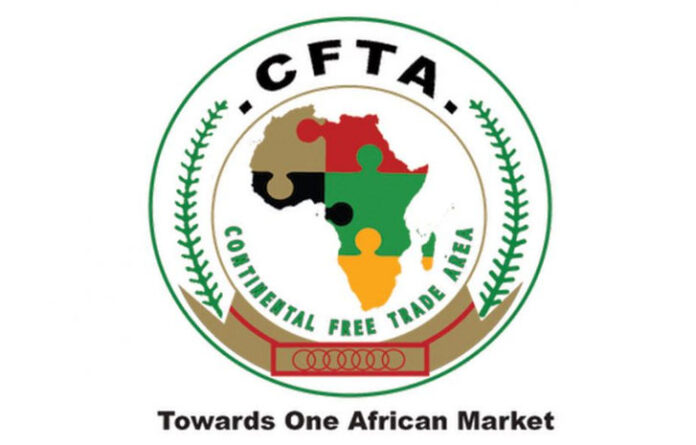Mr Francis Anatogu, Senior Special Assistant to the President on Public Sector Matters, has listed seven pillars that would enable Nigeria to maximise gains of the African Continental Free Trade Area (AfCFTA).
The seven pillars are, having a vibrant industry cluster in every state, highly productive workforce, grow domestic demand, having a good business environment, infrastructure, secure access to AfCFTA market and establishing an efficient AfCFTA trade agreement.
Anatogu spoke at the Primetime Reporters 3rd Annual Lecture and Awards, with the theme “Assessing Nigeria’s Readiness to Maximize the Gains of AfCFTA”, in Lagos.
“The target for AfCFTA is to have a single market for free movement of goods, services and persons, progressively eliminate tariffs and non-tariffs barriers and enhance competition.
“The objectives are also to deepen economic integration of the continent, improve and expand intra-Africa trade, provide rule-based engagement, facilitate dispute resolution and addressing injurious trade practices.
“For the country to maxise the gains of AfCFTA, there is the need to implement the seven pillars,” he said.
Anatogu, also the Secretary, National Action Committee on AfCFTA, said that there were strategic approaches that should be imbibed for the pillars to work, categorising these as arrowheads and high potential.
He described arrowheads as products and services in which Nigeria currently enjoys competitive advantage, evidenced by capacity to export in excess of $10 million annually.
The committee secretary said that high potential are products and services in which Nigeria was yet to build competitive advantage, exporting less than $10 million, but Africa demand exceeds $1 billion annually.
Anatogu listed some of the arrowheads as mineral fuels, mineral oils and products of their distillation, machinery, mechanical appliances, plastics, iron and steel, fertilizer, wood and articles of wood, among others.
For the high potential, he listed pharmaceutical products, sugar, confectionary, paperboard vehicles and other railway or tramway rolling stock, electrical machinery and equipment, natural or cultural pearls, printed books and others.
He said that the emerging strategic goals would grow production and export capacity of every state by developing industry and service clusters, value chain and ecosystem around specific products.
“Engender friendly business environment leveraging technology, predictable operating environment backed by policies,” Anatogu said.
He said that some of the challenges affecting AfCFTA implementation are insecurity, predatory trade practices, regulatory constraints, infrastructure and funding constraints.
Others include production and productivity issues which had to do with data deficiency and low adaptation to technology.
Listing the benefits, he said it would help to alleviate poverty, boost income, increase Africa’s export mostly in manufacturing, spur larger wage gains for women and boost wages for both skilled and unskilled workers.
“It is expected that when implemented, it will double intra African trade flow which stood at 15 per cent and double Africa’s share of world trade from 3 per cent to 6 per cent over the next ten years,” he said.




